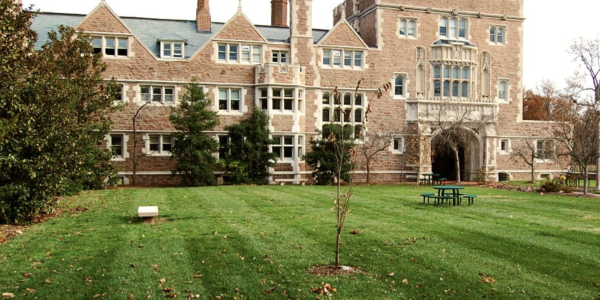Senior Leandrea Clay shares how she decided to major in African and African American studies after initially envisioning a career in science. Students in Arts & Sciences are invited to consider their own paths at the fall Major-Minor Fair on Oct. 14.
When she was still in high school, senior Leandrea Clay thought she would study neuroscience in college. After she arrived at WashU, however, she became interested in anthropology. After taking a variety of classes in her first year, she revised her plan yet again, landing on African and African American studies. She shared the story of her decision with the Ampersand.

What’s your major, and how did you decide what to study?
I’m majoring in African and African American studies (AFAS) with minors in anthropology and creative practice for social change (CPSC). In high school, I thought I’d like to study neuroscience. But, when I got to work in a lab, I was more interested in the patients and structural causes that landed them there than in the medicines we were developing. So, when I arrived at WashU, I considered a major in anthropology. In my sophomore year, I had a major internal debate: Would I focus on anthropology as a major or a minor? In my AFAS classes, I was able to practice anthropological methodology as well as the subject matter I really wanted to study. This was especially true with the projects I was working on, and I began to shape my coursework around my research projects. My AFAS classes aided me the most in making a decision about my major.
What are your research interests?
I'm originally from Jackson, Mississippi, and my research interests — Black Southern culture through literature, art, and music — reflect how I grew up. My first research project, which was funded by the Summer Undergraduate Research Awards (SURA) was called “Mississippi Mud.” It was about Black women’s archival visibility and their desire to stay in the rural south or move away. I conducted six interviews across three generations of Black women from Wilkinson County, Mississippi. In the spring of my sophomore year, I applied to be a Mellon Mays Fellow. My current project, “Black Sonicism: Cultural Maintenance and Evolution through N.O. Bounce Music,” is an interdisciplinary study that develops a framework to understand the tensions between Black music, regional identity, and technology.
What’s your favorite thing about your major?
I think one of the pleasures of being in AFAS is that this discipline literally came out of people fighting for its existence, specifically at WashU. The AFAS department here was created after members of the Association of Black Students mobilized and demanded a Black Studies department. There's a legacy of bold activism in AFAS.
Not only is Black Studies supported by activism, but AFAS also refutes the standard of knowledge production by considering people whose knowledge hasn’t traditionally been considered. For example, I interviewed my grandma for one of my projects. She was a teen mom and got her degree from a junior college after she graduated high school. AFAS helped me develop my interview skills, and my grandma became a viable resource for understanding how Black women think about the land and provided theoretical structures within AFAS to me help understand her knowledge.
What do you plan to do after you graduate?
I need a break! I’ve been going to school since I was 2 years old. I’m going to take one or two gap years. I plan to teach at a high school or middle school. Then I’m going to apply for graduate school to study ethnomusicology or African American studies.
Do you have any advice for students trying to choose a major?
For at least the first few semesters, just take classes that are interesting to you; try out different things. When I first got here, my parents wanted me to do something more practical. They got over it!
At the annual Major-Minor Fair, students are invited to talk to faculty members and get more information on many majors and minors at one time and in one place. This year's fair will take place Monday, Oct. 14.
More from the 'How I chose my major' series:
- Gaby Mendoza explored different subjects and career paths to find her perfect fit.
- Lorenzo Prila followed his instincts and overcame his fear of the unknown on his academic journey.
- Gracie Hime discovered a passion for philosophy-neuroscience-psychology and political science.





